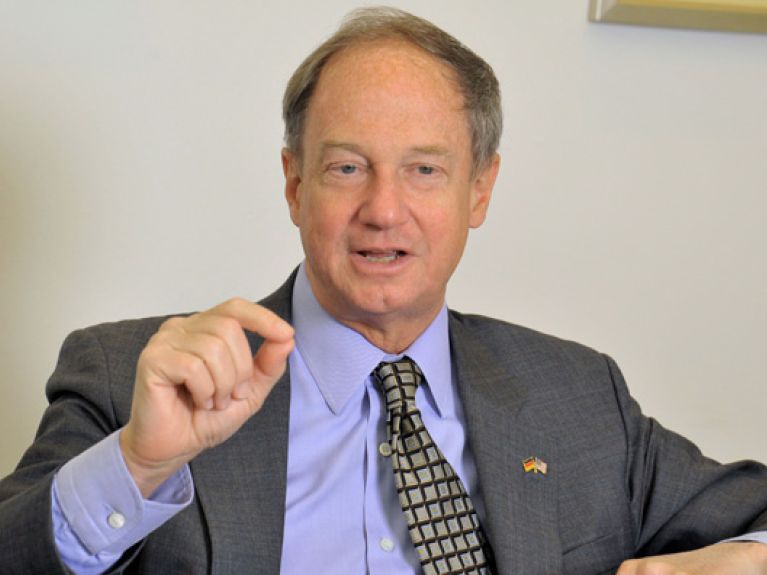“Germany and the U.S. can make a real difference”
U.S. Ambassador John B. Emerson on climate change as an area of mutual strategic interest, challenges of the refugee crisis and diplomacy in the Middle East.

Your Excellency, what are your personal impressions of how Germany is coping with streams of refugees?
At the federal, state, and local level, government administrators are exhibiting both great professionalism and humanity. More broadly, Germany is also showing leadership in working to address the migration crisis in Europe. The generosity and compassion that so many German citizens have shown the thousands of refugees coming to this country is commendable. The variety and number of events and classes that have been arranged by private, church, and NGO initiatives is remarkable. For example, my wife and I sat in language classes for refugees in both Munich and Berlin. The one in Berlin built on students’ knowledge of English as a bridge to learn German. Teaching staff – including a young American alumnus of the Congress-Bundestag Youth Exchange for Young Professionals, or CBYX program – were funding supplies for the students out of their personal funds. We decided to donate a supply of textbooks and are now looking into how we can support similar initiatives.
How do you evaluate Germany’s role in confronting this extraordinary situation?
In its commitment to provide immediate assistance to refugees and to work toward a long-term solution, Germany has proved that it is living the values on which the transatlantic community was forged. As members of the International Syrian Support Group, the United States and Germany are working with many nations to resolve the conflict that pushes Syrian refugees to flee in search of safety and a better future. As for the Chancellor‘s leadership, President Obama praised Chancellor Merkel at the G20 Summit in Antalya for her courageous stand in accepting the moral obligation to help vulnerable refugees.
Why is Germany an important partner for the United States when it comes to dealing with crucial challenges in the Middle East?
Today’s security challenges require multi-national, regional, and transatlantic cooperation. In this context, Germany has stepped forward to take a global leadership role. Germany worked hand-in-hand with the other members of the E3+3 to achieve a nuclear agreement with Iran. The Iran deal proved, once again, how diplomacy can bring about meaningful change – in terms of the potential peaceful resolution of conflict between nations and the resulting prospects for their citizens. Germany is actively engaged in the Middle East – in the resolution of the crisis in Syria and Iraq, the fight against ISIL, and the Middle East peace process.
How is the Ukraine crisis underscoring the importance of the partnership between the United States and Germany?
Germany’s role in the efforts to find a diplomatic solution to the crisis in Ukraine is a prime example of the transformation in German foreign policy. In May 2015, I visited Kyiv where I met with cabinet ministers, advisors, members of the Presidential Administration, Rada deputies, OSCE personnel, and German diplomats. One theme was dominant: the need for cooperation. Our interlocutors told us that without cooperation – whether between United States and Ukraine or between the United States and Germany – Ukraine would not be able to confront the challenges it faces.
In the past, President Obama has spoken highly of Germany’s efforts in the field of renewable energies and the fight against climate change, and the President’s clean power plan has been lauded in Germany. Is the fight against climate change becoming more and more important for the German-American relationship?
The environment is a top priority for both the Obama Administration and for the government of Germany, which are leaders in the fields of energy transformation and innovation. Indeed, climate change is an area of mutual strategic interest where Germany and the U.S. can make a real difference. Our two countries lead in some of the most advanced technologies and scientific expertise on climate change.
Climate change was a signature theme of Germany’s G-7 Presidency in 2015. G7 countries put forward post-2020 targets for reducing carbon emissions that set an example for other countries as they prepared for COP21. The G7 also agreed on the need to integrate climate risks into development assistance and investment programs – an essential element of a climate agreement that is ambitious, achievable, fair, and enforceable.
Before taking office as Ambassador in Berlin, you served in the President’s Advisory Committee for Trade Policy and Negotiations. What is your view on the heated discussions over T-TIP in Germany?
The United States is Germany’s number one export customer; and Germany is America’s largest trading partner in Europe and the sixth largest destination for our exports worldwide. In other words, we have a huge stake in the health and vitality of each other’s economies. However, unnecessary bureaucracy, and uncertainty over testing and product requirements stand between entrepreneurs and potential customers. Removing these barriers is a common-sense way to more effectively connect European entrepreneurs to U.S. consumers, and vice versa.
Unfortunately, the public debate in Germany over T-TIP is dominated by vague fears about globalization. The fact is, T-TIP will boost exports and support jobs. In terms of standards, T-TIP will be an agreement between the most highly regulated economies on the planet. With T-TIP, we have the opportunity to be standard-setters and to build an economic and strategic framework that can serve as the foundation for shared prosperity well into the coming century. ▪
Interview: Johannes Göbel

